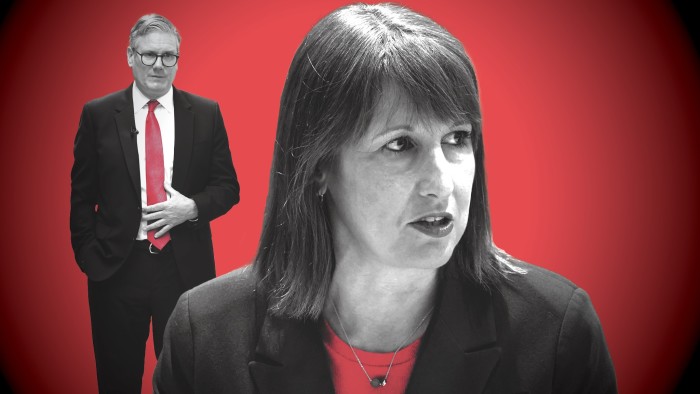Unlock the Editor’s Digest for free
Roula Khalaf, Editor of the FT, selects her favourite stories in this weekly newsletter.
For a chancellor with an apparently guaranteed job until the next election, Rachel Reeves’ position has never been more under pressure.
Sir Keir Starmer’s U-turn on Reeves’ first big decision as chancellor — her scrapping of winter fuel payments for 10mn pensioners — has raised questions about her judgment and whether she has been weakened.
Downing Street insisted that the prime minister stood by his statement in January that Reeves would stay in the Treasury until at least the next election, but one Labour MP remarked: “Starmer is ruthless. Everyone is safe until they are not.”
This was not any old U-turn. Reeves’ decision to means-test the winter fuel payment was portrayed in July 2024, weeks after Labour’s election win, as evidence she was prepared to take tough decisions to bring order to the public finances.
Starmer’s confirmation on Wednesday that the cuts would be partially reversed raised questions about whether Reeves will be seen as a chancellor who can be pressured to retreat the next time she makes an unpopular decision.
There are likely to be plenty of those to come. On June 11 she will announce the results of a grim public spending review, with ministers forced to make cuts to stay within Reeves’ tight fiscal plans. Big welfare cuts are in the pipeline.
And in the autumn the chancellor will present a Budget in a fiscal straitjacket, with the unenviable prospect of having to cut welfare further or announce more tax rises.
Labour MPs, who put fierce pressure on Reeves and Starmer to abandon the winter fuel payment plan, are now mobilising to persuade the chancellor to back off over welfare cuts.
John Glen, a former Conservative Treasury minister, said: “The chancellor was warned repeatedly not to take this decision on winter fuel payments. The U-turns will lead her MPs and the markets to challenge her in other areas.”
But John McDonnell, former Labour shadow chancellor and now an independent MP, argued that Reeves and Starmer should consider “how we got into this mess” and ask “if the lesson has been learned about cuts to disability benefits”.
Labour MPs have been spooked by public opposition to the winter fuel payment cut, which contributed to the party’s grim performance in the English local elections earlier this month, when it lost 187 seats.
“Voters think Rachel is a really hard-nosed mean person,” said one Labour MP. “I’m not sure that’s entirely true but it’s what they say on the doorsteps.”
Labour figures close to Starmer say that Reeves was more willing to retreat on the issue than the prime minister, who feared it would make the government look weak. Number 10 insisted: “The chancellor and prime minister are in lockstep.”
The U-turn had been under discussion since the local election results and the torrent of angry feedback from Labour MPs and defeated councillors. But Starmer’s announcement on Wednesday still caused some surprise.
Some Labour MPs believed the prime minister confirmed a planned partial retreat to divert attention away from a memo from deputy prime minister Angela Rayner’s department, seen by the Daily Telegraph, urging Reeves to increase taxes.
One Labour MP said policy was being made on the hoof. “How does a partial U-turn help us?” the MP asked. “It’s all tactics and reactive management.”

The Rayner memo, sent in March, suggested Reeves should raise taxes by up to £4bn, mainly on the wealthy, as an alternative to cuts. After the winter fuel payment retreat, tax rises may seem less politically risky than further welfare cuts.
One veteran Treasury official said that by giving ground on the winter fuel issue, Reeves might earn some credit with Labour MPs. “It’s not catastrophic if it helps get disability benefits through,” the former official said. “But if it just paves the way for further defeats? Time to get a new chancellor.”
While Reeves received a boost from first-quarter growth figures showing a larger-than-expected GDP expansion of 0.7 per cent, official figures do not suggest this is doing much to bolster the health of the public finances.
Public sector net borrowing was £151.9bn in the fiscal year 2024-25, some £20.7bn above the previous year and £14.6bn above the OBR’s March forecast.
“We suspect the chancellor’s fiscal predicament will only get worse later in the year,” said Ruth Gregory at Capital Economics.
Labour MPs hope that the winter fuel U-turn will lift a weight from the government. “It was our original sin — the moment people formed a moral judgment on us,” said one newly elected MP.
But for Reeves, who has promised to be an “iron chancellor”, was it a sign of weakness? Her allies insist not. “It’s not like a government hasn’t done a U-turn before and gone on to win an election,” said one.




